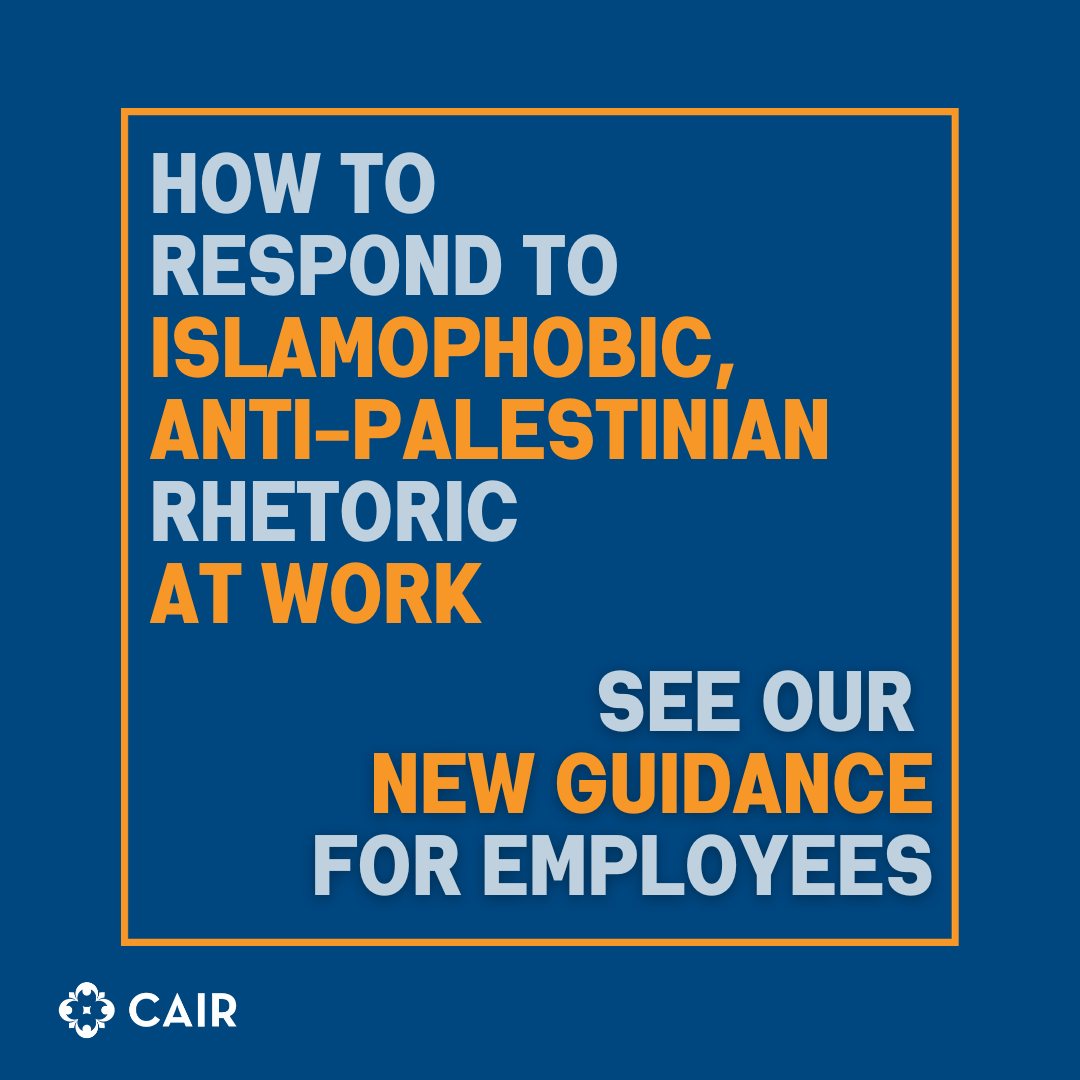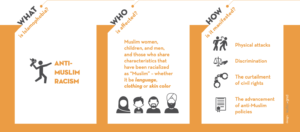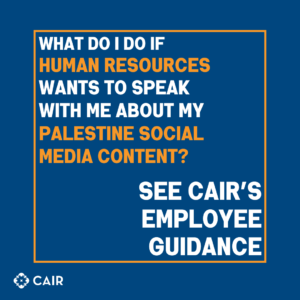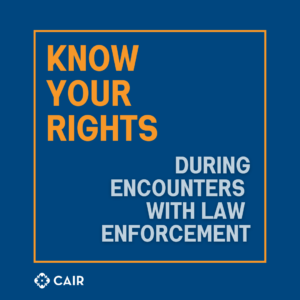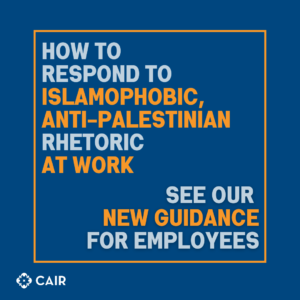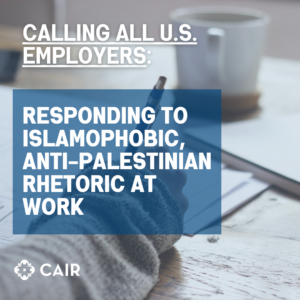CAIR is releasing guidance to U.S. employees who are impacted by their employer’s stance on the current violence inflicted on the Palestinian people in Gaza and the West Bank. As of October 18, the Palestinian Health Ministry reports that the number of Palestinians dead due to Israeli attacks in Gaza since October 7 has reached over 5,000, including around 2,000 children, and more than 15,000 individuals have been wounded.
In the last several weeks, CAIR has witnessed increased reports of fear and intimidation experienced by students and employees who are directly affected by the current war on Gaza or sympathize with those directly affected. Several students have reported having employment offers rescinded. Other students have seen their names and personal information, including past employment, published on various websites that reportedly seek to damage their career prospects.
Employees are also experiencing intimidation should they choose to express support for Palestinian human rights. Multiple websites have emerged to target employees in recent days, documenting the names of individuals at major corporations who expressed support for Palestinians under attack in Gaza. Corporate executives, such as one JP Morgan Chase executive, have amplified efforts to intimidate employees who oppose the humanitarian crisis in Palestine. These efforts together send a clear message to employees: support for Palestinian human rights may cost them their career.
In response, CAIR has already issued guidance to employers, which includes information on their legal limitations as well as best practices in their approaches to employees. Today, CAIR is also releasing guidance to employees on how to navigate workplace environments, as well as how to approach their employers about their stance on Israeli aggression in Gaza and the West Bank.
Legal Implications: Know Your Rights as an Employee
CAIR encourages all employees to review these points:
-
- Federal and state laws prohibit discrimination and retaliation. Federal law and many state laws protect employees from discrimination based on protected classes such as religion, race, and national origin. Employees may not have employment offers rescinded, be terminated, or harassed because of their protected classes. Employers may not subject employees to different terms and conditions of employment because of their protected classes. These laws also provide that employees have the right to be free of retaliation for protected employment activities, such as complaining about discrimination. Employees who believe they have a discrimination or retaliation claim should immediately contact their local CAIR office to schedule a legal consultation.
- There may be First Amendment protections for government employees. The First Amendment generally protects the free speech of government employees if the employee is speaking as a private citizen, about a matter of public concern, and the speech does not interfere with the employee’s job. Exceptions may apply. CAIR encourages you to refer to the ACLU’s flow chart on free speech protections for federal employees for specific information. The First Amendment does not protect employees from retaliation by non-government entities like private employers.
- Some states have laws that may protect an employee from retaliation related to political activity, but not all states do. There may be state laws that protect political speech or political affiliation. For example, in California, employers may not prevent an employee from participating in the political arena in any capacity. In New York, employers may not discriminate against employees because of political activities that take place while off-duty, outside an employer’s premises, and without use of employer equipment. Each state’s laws are different and not all states may have adequate protections. Employees should consult with their local CAIR office about whether there are state-specific protections that may protect them.
- Your employment contract may impact your legal rights and remedies. Employees may have specific clauses in their employment contracts that impact their rights and legal remedies. Employees should review their employment contracts and consult with a local attorney to make informed decisions and protect their rights.
General Best Practices
CAIR also encourages employees to consider the following best practices:
-
- Report any incidents of bias, discrimination, and/or harassment to CAIR. If you believe that your rights are being violated, contact CAIR immediately.
- Request time off or flexibility in deadlines. We have witnessed many employers express solidarity with and offer flexibility to Israeli employees affected by ongoing developments. If your company has held this stance for its Israeli employees, we encourage you to consider requesting this same flexibility if you are a Palestinian and/or Muslim affected by recent Israeli attacks and subsequent uptick in nationwide anti-Arab and Islamophobic rhetoric.
- Seek out mental health resources. It is difficult to cope with the events in Palestine and increasing rhetoric against Palestinians and Muslims in the U.S. If you are in need of support, we encourage you to consider visiting: Maristan, which has developed resources to help Muslims experiencing mental health difficulties, and the Khalil Center, which is organizing virtual psycho-spiritual support groups.
- Review past CAIR guidance on activism and avoiding doxxing. CAIR has recently released guidance for those who seek to advocate on behalf of Palestinian rights while doing so effectively and safely.
Responding to Employer Statements
CAIR has documented multiple instances of companies releasing one-sided statements in support of Israeli civilians, while neglecting the violence unleashed by Israeli forces against Palestinians in Gaza and the West Bank. If your company has released such a statement and you would like to respond, CAIR encourages you to use the following template letter to employers. Please note that this template constitutes suggested material to empower you to advocate for yourself. It does not constitute legal advice.
————————————————————————————————-
Dear [Company Executive]:
I am writing regarding a statement you published on [DATE] about the ongoing violence in Palestine and Israel. In the statement, you wrote: [COMPANY’S ONE-SIDED STATEMENT ON ISRAEL].
I join you in condemning the deadly targeting of civilians in Israel on Oct. 7, 2023. Targeting civilians—whether Israeli, Palestinian, American, Ukrainian, or any other nationality—is a war crime and violates not only international law, but the basic moral principles all should consistently embrace.
However, I and other employees, are deeply concerned that your statement omitted any mention of the Israeli government’s deadly targeting of Palestinian civilians either before or after Oct. 7. The Israeli government’s bombing of apartment buildings, mosques, schools, and other civilian targets in Gaza had killed numerous innocent Palestinian civilians by the time you issued your statement on [DATE]. The bombing has now killed over 5,000 Palestinians, including 2,000 children. The Israeli government has also denied the many innocent people of Gaza access to water, food, electricity, and fuel, and demanded one million Palestinians leave their homes in northern Gaza or face death.
These threats to Palestinian livelihood by the Israeli state are not new. I urge you to consider the following facts, as reported by known human rights organizations Amnesty International and Human Rights Watch:
-
- In 2023 alone, over 250 Palestinians, including 47 children, were killed in the Occupied West Bank.
-
- Israeli settlers have dramatically increased violence against Palestinians, with 600 attacks recorded in the first six months of 2023.
-
- Palestinians have for decades faced home demolitions, land confiscations, detention in Israeli jails for years without facing criminal charges (including Palestinian children), the desecration of both Christian and Islamic holy sites, and countless injustices.
-
- The blockade of the Gaza Strip, which began in 2007, has continued to make the land into an open-air prison for its residents.
-
- Gaza continues to be besieged with snipers stationed all around, drones present in the sky at all times, and navy patrols ready to shoot at even fishermen who venture too deep into the water.
-
- Palestinians in Gaza are only allowed 4 hours of electricity a day.
-
- 97% of the water in Gaza is undrinkable.
-
- Gazans are unable to easily travel to get medical treatment.
By not mentioning this violence against the Palestinian civilians in your original statement or expressing any concern about the Palestinian people as the death toll in Gaza rose over the past week, [COMPANY NAME] made Muslim, Palestinian, and Arab employees feel marginalized and unrecognized. I, and many in my community, are in a state of grief over the loss of lives. The company’s failure to acknowledge that suffering has compromised my well-being in the workplace. Given [COMPANY NAME]’s stance promoting diversity, equity, and inclusion in the workplace, I hope that you will consider affirming that your Palestinian, Muslim, and Arab employees and those who care for them are also respected and valued here.
Moreover, the omission also contributes to a harmful environment for Palestinian, Muslim, and Arab-Americans across the country. We are witnessing rising anti-Arab and Islamophobic sentiment in the U.S. due to events in Gaza, which such statements have failed to condemn.
To address these concerns, I ask [COMPANY NAME] to issue a follow-up statement to the public that:
-
- recognizes the humanity of both Palestinian and Israeli civilians.
-
- condemns the Israeli government’s ongoing bombing and threats of ethnic cleansing against Palestinian civilians in Gaza, including the denial of basic human necessities.
-
- condemns the anti-Muslim and anti-Palestinian bigotry that has become commonplace in media, politics, and social media, allegedly contributing to the horrific murder of 6-year-old Palestinian boy by his family’s landlord in Chicago on Oct.14.
-
- encourages companies that choose to comment on the crisis to issue similarly balanced statements and respect the full diversity of experiences and perspectives.
Thank you for your attention to this matter.
